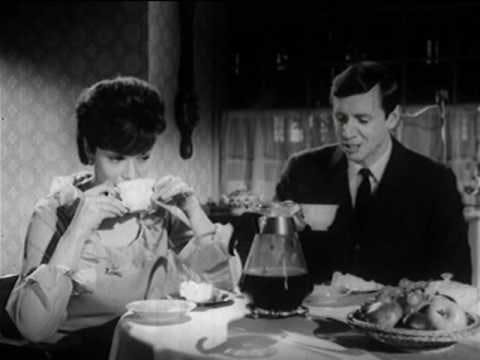
Folger's TikTok
I just watched a TikTok by a teacher named Dan Lewer, in which he stitches a Folger’s commercial from the 1950’s alongside a video of himself with the caption “I use this clip every year teaching US history.”
The commercial opens on a black and white video of a woman, clearly a housewife, coming up to her smartly dressed husband in their classic 50’s kitchen to ask him what he’d like for his birthday. Exacerbated, he says all he wants is a decent cup of coffee, because boy does her coffee stink. She gasps! “It mustn’t be that bad!” she exclaims. “Honey,” he explains, “the girls at work can make a better cup of coffee on a hot pad. Anyway, I’m leaving.”
Cut to the woman sitting with a female friend, anxious about how her husband walked out without “even a kiss goodbye,” and lamenting how she’d better learn to make a cup of coffee soon. “Well why don’t you try Folger’s?” the friend peppily suggests.
Of course! The answer to her problems! The wife makes her husband a cup of Folger’s Instant coffee that evening for his birthday, and he loves it. “Better than the girls’ at work?” she asks, eyes wide and pleading. “Much better,” he croons as he blows out a candle on the table, enshrouding them in sensual darkness and ending the commercial.
I sat through the entirety of the video because I expected Lewer to discuss why he makes a point to show this video in every US History class. I assumed it was to show how commonplace misogyny was in the 1950’s, to the point of being a quintessential tool in advertising.
The top comment on the video was “Teaching to see history with objectivity instead of outrage is the best thing you can do to cultivate an intellectual.” Below it was the video creator’s response: “it’s a glimpse into the past. And slows up to view a piece of American social and economic history.”
I watched the video the creator had made in response to that top comment. In it he opens by congratulating the commenter by being the lone voice in a “sea and torrent of outrage,” and declares that he uses this commercial to allow his students to “swim around in history” and come to their own assumptions on the American economy and what gender norms were at the time. He criticizes people in the comments for “losing their cool” and becoming impassioned as a result of a video that was merely “a piece of history.”
Naturally, the comments on this video were almost exclusively along the lines of “it’s realistic for women and girls to feel anger when confronted with blatant sexism” and “how do you expect women to not be upset that this was once okay.” In direct response to the second comment, he created another response video in which he swears the limit of the video affected his ability to provide nuance to the situation. He explains how he was going through the comments section of the original video and was shocked by the “diatribe of vicious attacks people were making on one another” in response to the commercial. He describes the reactions as “hysterical,” doubling down on his stance that the video is worthwhile exactly because it sparks outrage and debate.
Interested in this “hysterical” comment section, I returned to the original video and scrolled through about 50 comments. Many of them are simply reacting back to the comment section: “this comment section is a hit list,” “these comments are… not surprising,” “you can tell who wants to be edgy so badly in these comments.”
There are a spattering of critical comments: “I like the aesthetics of the era but not the casual abuse and the smell of cigarettes,” “to think people romanticize this era,” “mate he’d be wearing that coffee.” However, the VAST majority of the comments are along the lines of “wish we could go back!,” “how it should be tbh,” “w husband,” women used to do something for their partner on their birthday? Man the 50’s were crazy,” “good old days.”
Let’s dissect this a bit. From my experience, there’s a very particular archetype of historian, and man, that this creator has fallen into. He’s a white, male, educated person who is convinced of his intellectual superiority because he can come into conversations around topics that elicit anger and emotion because he’s coming into them removed. He’s coming in from a “neutral perspective.” He’s using “logic,” and is not letting his “emotions overcome” him. This type of ‘intellectual’ believes that because he doesn’t feel any emotion as a reaction to casual horrors of history, even as banal as this commercial, he is therefore intellectually superior to those who enter the conversation with any emotion.
It should be unsurprising, of course, that almost every critical comment was left by a woman, and almost every misogynistic or reactionary comment was left by a man. Showing this commercial and encouraging your students to react to it in terms of the economy, but to not let any discussion of the casual sexism or emotional manipulation displayed affect your views, feels like a spring-loaded trap. It’s a trap set exclusively for the people who are going to react most strongly to this content, who have lived their entire lives under the constant reminder of these gender roles surrounded by the same men who publicly post comments like “wish we could go back!”
Your superiority complex about coming into conversations “neutrally” or “logically” is exactly why you shouldn’t be in these conversations in the first place. By condemning only those who voice “wow this is fucked up!” as emotionally-charged and unable to have a dialogue about the content, you are putting on full display your own inability to listen and have a dialogue.
As a former history major, I see in this commercial a video from a time when misogyny was so accepted and commonplace that it was used as a marketing tactic. The commercial sets up the housewife as failing in her duties as a wife: her husband is unhappy and she’s unable to fulfill him in the ways that are deemed expected by the society around her. He directly compares her to the other women in his life, insinuating that she is not only failing as a wife, but as a woman, as her competition for this man’s attention is being stolen by the “girls at work.” Her lamenting to her friend about her husband leaving “without even a goodbye kiss” is a clear sign of his rejection, and elicits in the viewer the understanding that your husband might actually leave you, or stop loving you at the very least, if you cannot satisfy him with something as basic as a cup of coffee. The sexy candle-lit coffee scene at the end cinches the pervasive messaging of your duties as a wife able to make a good cup of coffee being as ingrained as your responsibility to fulfill him sexually. This commercial is meant for women to see it and want to avoid this failure at all costs.
And the commercial makes me angry. It makes me angry because it outlines so succinctly the suffocatingly small box that many western women still feel stuffed into. It angers me because this was the norm for decades past the 1950’s, and sexist commercials are still on television regularly today. It angers me because teachers like this man, if they were living during this time period, would not have seen anything wrong with commercials like this because it doesn’t anger them. Because commercials and societal norms like this would still be strictly enforced and in place today if it was up to the men in power. Because it is ONLY due to people who were angry enough to speak out against these constrictions and expectations that anything has changed between now and then. It is due to the angry people that this commercial can spark outrage and not acceptance. It is due to them that commercials so blatantly misogynistic aren’t being used to sell anything anymore.
People in power don’t just wake up one day and realize “maybe what we’re doing is wrong? Maybe we should start dismantling some of these systemic boundaries to allow everyone to have as equitable and fair a chance to prosper as I have had!” People in power have the privilege to look at history with this “objective perspective” and “put logic over emotion” because they have only ever benefited from history being the way it was. Your objective perspective is not anywhere near objective: it is severely lacking an understanding of how the norms and accepted attitudes of yesteryear are still flourishing and alive and well today. It is a persistent ignorance to empathize with why this content may elicit what you deem to be “hysterical” responses decades later. It’s because, while these attitudes can no longer be woven into every single commercial and every single ad and every single conversation of your life, they’re still ever-present for anyone actually targeted by this messaging. It’s in the dieting industry telling you if you don’t lose that Christmas weight, your man will no longer find you attractive. It’s in the magazines with airbrushed models living out fantasies unreachable to you without acquiring this perfume or that mascara. It’s in a pink razor costing twice the price as a blue one and a women’s haircut costing $100 while men are charged $20. It’s in the girl’s shorts only coming in lengths half as short as the boy’s pants do, and with none of the pockets.
It’s everywhere, all the time, and even if the messaging isn’t “your husband will leave you if you don’t make coffee as good as the women in the office,” at the root of it it’s still all the same messaging. And if anyone is able to view that with no opinion, no emotion, or no reaction, then they are part of the problem.
